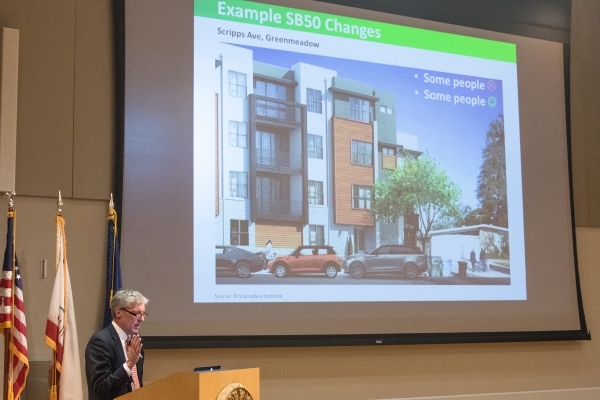State Senate Bill 50, a contentious bill that aimed to encourage more housing near transit and that stirred intense opposition on the Peninsula, suffered a stinging setback Thursday, when the chair of the state Senate Appropriations Committee announced that he will not be bringing the bill up for a hearing until at least early 2020.
While the announcement by state Sen. Anthony Portantino, D-La Cañada Flintridge, does not kill SB 50, it ensures that the Legislature will not take up the bill this year. Now a "two-year bill," SB 50 will be eligible for a vote next January.
The decision comes just weeks after SB 50 scored several victories at the committee level, with the Housing Committee and the Finance and Government Committee each voting last month to advance the legislation (in both cases, the bill passed overwhelmingly, with just one dissenting vote). Authored by state Sen. Scott Wiener, D-San Francisco, the bill has also undergone significant changes in recent weeks. On April 24, Wiener merged his bill with another proposed bill, Senate Bill 4, to create a two-tiered system with different requirements for counties that have fewer than 600,000 residents.
While the changes have helped Wiener pick up political support in Sacramento, the bill continued to face significant opposition at the local level in various pockets of the state. The Palo Alto City Council last month took a position against the bill, which would have loosened parking requirements and height regulations in areas within half a mile of transit hubs, including in single-family neighborhoods.
Under the bill, three- and four-story buildings would be allowed in these areas. In addition, the bill would loosen density regulations throughout "jobs-rich" cities like Palo Alto (though height limits would apply outside the transit-friendly areas).
Various mayors and city councils have attacked the legislation as a "one-size-fits-all approach" to tackling the housing crisis and attack on local control. Palo Alto Mayor Eric Filseth dedicated most of his "State of the City" speech in March to criticizing SB 50 and Menlo Park Ray Mueller has taken a public position against the bill.
Last month, Palo Alto submitted a letter to its Sacramento representatives declaring its opposition to the bill.
"The proposal to render cities unable to regulate parking, density and height, as examples, strike at the ability of local governments to not only define the nature of their communities, but also fails to acknowledge individual situations where these regulations are necessary to avoid spillover impacts on surrounding neighborhoods," Palo Alto's letter states.
Mountain View leaders echoed similar concerns about losing local control if the bill were to pass. While City Council members avoided taking a direct stance of opposition, they signed onto a joint letter by the Cities Association of Santa Clara County, urging state lawmakers to prioritize funding to build housing.
East Palo Alto officials, by contrast, have been more sanguine about SB 50. At a joint meeting earlier this month with Palo Alto and Menlo Park city councils, several East Palo Alto council members stressed the need to address the state housing shortage and challenged cities that oppose SB 50 to present their own alternatives to the legislation.
"It's really going to take the political will of California to pause for a second and to relinquish the concept of local control for this housing transportation crisis that we're in," East Palo Alto Councilman Larry Moody said at the May 6 meeting.
For housing advocates, the bill was seen as a cornerstone of the multifaceted "Casa Compact," a package of strategies intended to help remedy the statewide housing crisis. If approved, the bill was promoted as a way to "unlock" development for up to 3 million new homes near transit hubs.
In a statement, Wiener said that while he is "deeply disappointed" that the bill will be postponed, he and other supporters of SB 50 are "one hundred percent committed to moving the legislation forward."
Wiener pointed to California's housing shortage, which is estimated at 3.5 million homes — equal to the combined housing shortage of the other 49 states. The status quo, he said, isn't working.
"We need to do things differently when it comes to housing," Wiener said in a statement. "We're either serious about solving this crisis or we aren't. At some point, we will need to make the hard political choices necessary for California to have a bright housing future."
Mark Noack contributed to this report



Comments